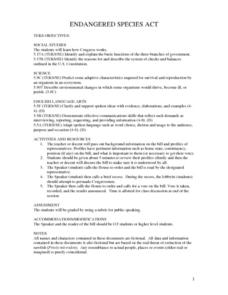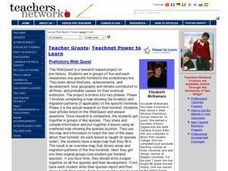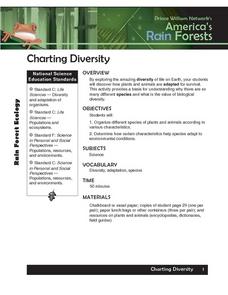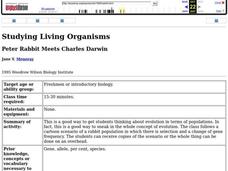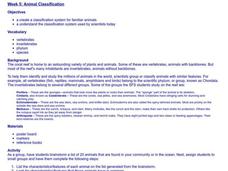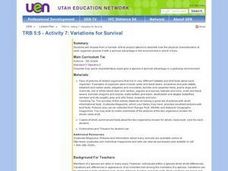Curated OER
Endangered Species Act
Students spend the duration of this instructional activity examining the text of the Endangered Species Act. Individually, they complete a profile to determine where they stand on the bill and read excerpts from it. Some role-play the...
Curated OER
Prehistory Web Quest
Sixth graders identify how geography and climate determine the lives of early hominids, the characteristics of hunter-gatherer societies, how animals affected the lives of early hominids, and how hominids overcame their physical...
Curated OER
Impact of Exotic Species on Lake Ecology
Students examine the effect of foreign species on various habitats. In groups, they identify the population dynamics of the zebra mussel. They calculate averages and graph data from Seneca Lake in New York. They develop hypothesis...
Curated OER
Dendrology
Students work as a class-size unit as well as in small groups to become proficient in observing tree characteristics to facilitate species identification. They identify most common tree species by observing leaf, flower, fruit and bark...
Curated OER
Native Versus Exotic
Students investigate the presence of exotic and natural species in the ecosystem. They define the differences between exotic and native while looking at one specific ecosystem in Maryland. They write how the exotic species are considered...
Curated OER
Species Diversity and Phylogeny
Students explore the classification system of organisms: taxonomy. They examine prepared slides of Protozoans and record information on a Taxonomy Recording Sheet. Two additional classifying activities are also included in this lesson.
Curated OER
Ten Important Hardwoods
Students discuss ten important Pennsylvania hardwood trees, examine characteristics of each tree species, evaluate economic and ecological importance of hardwood trees, and recognize at least two characteristics of each species.
Curated OER
Species Interactions
Students study the scientific concepts of biodiversity and conservation through the use of basic equations of population growth and hands-on experiments/simulations. The lesson includes a take-home assignment which can be used for final...
Curated OER
Coqui Frog Camouflage
Students investigate the concept of the coqui frog of Puerto Rico. They conduct research using a variety of resources. Students explain in oral or written form some of the characteristics to that identify the frog. The lesson includes...
Curated OER
Charting Diversity
Students organize different species of plans and animals according to various characteristics. Students then determine what characteristics enable them to survive in their habitat. Game ideas and activities are included.
Curated OER
Studying Species By Examining the Evolution of the Canidae Family
Pupils read an article on the characteristics of wolves and dogs then complete a phylogenetic tree of the canid family. They then write an essay justifying why or why not wolves and dogs should be classified as different species.
Curated OER
A Fiedl Study of an Integral Species
Young scholars compile baseline population information on a local species. They design and conduct a scientific investigation of a local species. Students interpret, analyze and communicate results based on sound scientific and...
Curated OER
Studying Species by Examining the Evolution of the Canidae Family
Students examine the definition of species. Students complete a phylogentic tree of the Canidae family. They write an essay justifying why or why not wolves and dogs should be classified as different species.
Curated OER
Peter Rabbit Meets Charles Darwin
Ninth graders explore evolution. They study a cartoon scenario of a rabbit population in which there is selection and a change of gene frequency. Students discuss frequencies, evolution, and speciation.
Curated OER
Backyard Wildlife Conservation
Students survey local wildlife. They distinguish between permanent and migrating or seasonal species. Students identify species and describe the ecological niche. Students research the food chain and food web for the backyard...
Curated OER
Animal Classification
Students list characteristics and features of animals found in their community. They then group the animals according to how they are similar and different and create names for each group. They then create a chart of their...
Curated OER
How Many Critters Live Here? Estimating Wildlife Populations.
Learners examine how wildlife biologists estimate the population of particular species. They work on map construction and population sampling. They use sampling to estimate the population of spiders in a study area or a forest.
Curated OER
What Do Monarch Caterpillars Eat?
Learners record and analyze what types of food monarch caterpillars will eat.
Curated OER
Birds of the Northeast
Students identify several common birds through field observations, preserved specimens and personal experience. They classify the species and choose one to research. They draw a migration map and participate in a project that benefit...
Curated OER
Variations for Survival
Fifth graders examine two related organisms that live in different environments and compare how the physical characteristics of each organism provided it with survival advantages unique to its own environment.
Curated OER
Classy
Students explore the classification system in this seven lessons unit. The diversity of life forms and their characteristics are examined using a microscope. Kingdoms, classes, and families are investigated.
Curated OER
Everything in Its Place: Science Classification
Students investigate the system of classification for living things through the sixteen lessons of this unit. The five kingdoms of monerans, protists, fungi, plants, and animals form the basis of several experiments as the similarities...
Curated OER
Where Do I Belong?
Tenth graders study the diversity of life in the world. They classify and sketch organisms into the 6 kingdoms.
Curated OER
Life at Risk
Students examine the characteristics of the peregrine falcon. They investigate endangered and extinct species, and how the environment affects the process.


